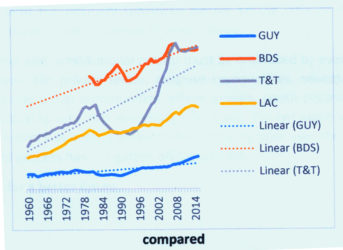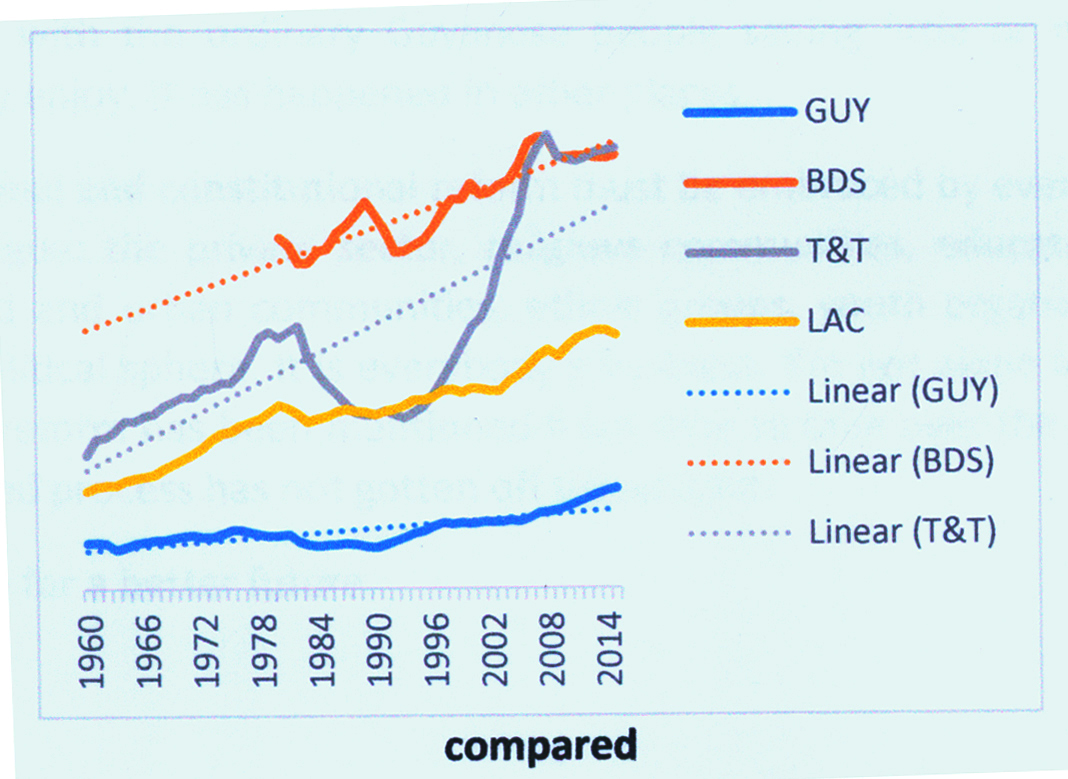Dear Editor,
Guyana’s Jubilee anniversary has come and gone, the excitement is over and we are now well into the next 50 years of the nation’s existence. The question is, what can we expect of the next 50 years?
One thing that the Jubilee engendered along with the celebration was a certain amount of reflection ‒ whether privately or in newspaper articles and letters ‒ albeit misted by an atmosphere of euphoria that tended to gloss over the failures of the past and exaggerate our achievements. This is understandable in the moment of celebration, but while it gives me no pleasure to say it, the fact is that over the first 50 years of our existence as an independent nation we have not done well. I don’t think there is anyone who would dispute that.
 The country has deteriorated and fallen behind economically in terms of average living standards enjoyed by its citizens. As the chart below shows, average Guyanese output per person which is the basis for living standards has hardly changed since 1960 while our Latin American and Caribbean neighbours have enjoyed significant growth. Admittedly, GDP figures do not tell the whole story but they are a useful indicator. Add to that the virtual collapse of infrastructure resulting in frequent outages of water, electricity, bad roads, etc., the rise of poverty, homelessness, crime, the massive emigration of its citizens to all parts, and the scale of the deterioration begins to be appreciated.
The country has deteriorated and fallen behind economically in terms of average living standards enjoyed by its citizens. As the chart below shows, average Guyanese output per person which is the basis for living standards has hardly changed since 1960 while our Latin American and Caribbean neighbours have enjoyed significant growth. Admittedly, GDP figures do not tell the whole story but they are a useful indicator. Add to that the virtual collapse of infrastructure resulting in frequent outages of water, electricity, bad roads, etc., the rise of poverty, homelessness, crime, the massive emigration of its citizens to all parts, and the scale of the deterioration begins to be appreciated.
GDP per capita trends since 1960: Guyana, T&T, Barbados and Latin America & the Caribbean Group
Against this background, it would seem to me that the best way to honour our jubilee is to determine the path to take to a better future and better performance over our second 50 years. To that end, we must redouble the spirit and processes of reflection and analysis in an atmosphere of open dialogue with all sections of civil society participating.
At this time the future looks positive for Guyana with all this talk of oil wealth, but then when has it not looked positive? For so long we have heard of Guyana’s huge ‘potential’. In fact, when I think of how often I’ve heard of Guyana’s potential and the squandered opportunities of the decades, I must confess that I get a slightly sickly feeling.
At last it appears that the country has hit the jackpot and our long-held dream has been realized: we have found oil ‒ plenty of it, apparently. Well, as far as that is concerned, I want to offer a cautionary note. It has to be understood that it is people who create growth and wealth and development, not resources. If resources had been that critical, the ranking of countries in terms of development levels attained would have been more predictable and the likes of Japan and Switzerland and Singapore would not be at the top of the table. Closer to home, the development of Barbados compared to countries like Guyana and Jamaica and others in Latin America and the Caribbean with high natural resource endowments is a case in point. The fact that natural resources don’t guarantee development is a lesson that we should have learned long ago having jumped on the sugar, bauxite, gold wagons over the years, and not gotten very far. It is worth noting from the chart the period of serious decline experienced by Trinidad and Tobago in the late eighties, early nineties with all its oil wealth.
Mind you, I am not saying that becoming an oil producer is a bad thing. There is no doubt that it can turn out to be a real bonanza for the country after all the hard times. Sure enough, being endowed with valuable natural resources can make a difference, but they’re not necessarily the magic bullet that Guyanese have been looking for all along.
This line of thinking leads me back to a position I articulated in a letter to the Chronicle editor published in 2015. The first priority for our nation is to fix the institutional environment starting with constitutional reform. This is necessary to ensure that we improve the ways in which we manage our society, which has clearly been the area of our greatest failure. Without institutional reform, we can easily have a situation where oil wealth will show up in rising GDP figures, but with the ordinary Guyanese people seeing little or no improvement in the comfort and wealth they enjoy. It has happened in other places.
This process of institutional and constitutional reform must be embraced by every section of civil society through a vibrant dialogue: the private sector, religious communities, educational institutions, trade unions, rural, hinterland and urban communities, ethnic groups, youth organizations, you name it. It cannot be left to the political sphere. It is everybody’s business. I’m not alone in pushing this idea. The need for constitutional reform has been mentioned from time to time over the last couple of years but (predictably) a committed process has not gotten off the ground.
It remains an imperative for a better future.
Yours faithfully,
Desmond Thomas

